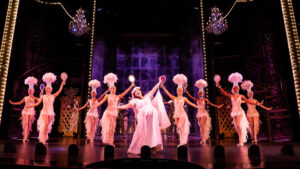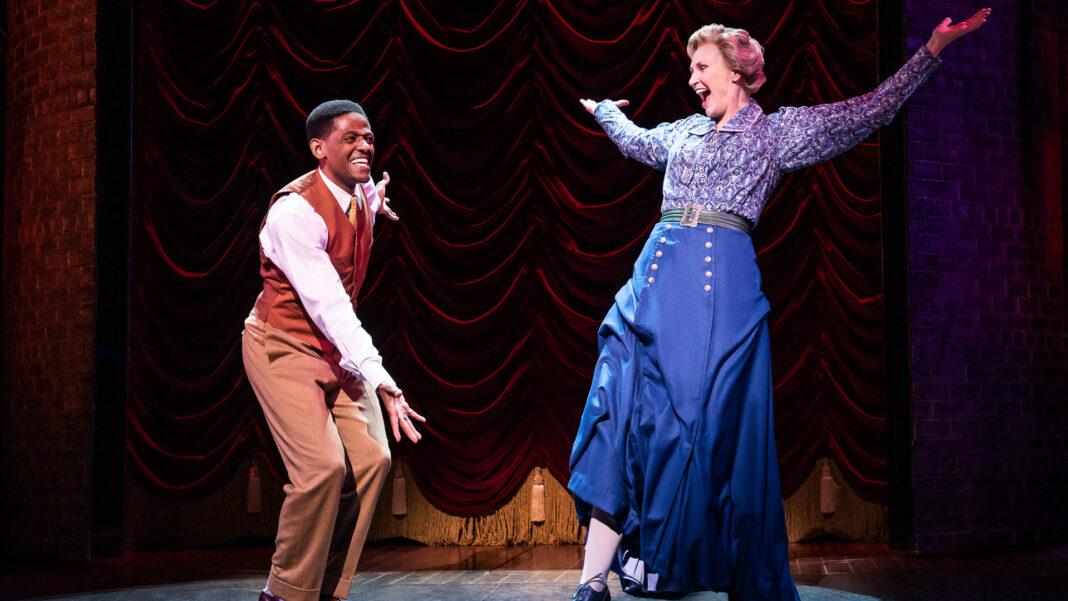“Whenever I got a show or something big in show business, my mother would call me and sing, ‘Who taught her everything she knows.’ So now I get to sing that, so it’s a perfect circle.” A perfect circle indeed for Jane Lynch who plays Fanny Brice’s mother in the first-ever Broadway revival of Funny Girl.
The show, which official opens on Sunday, April 24th at the August Wilson Theatre in New York, tells the story of Fanny Brice, her time as a member of the Ziegfeld Follies and her passionate and troubled romance with Nick Arnstein. Beanie Feldstein plays Brice with Ramon Karimloo as Arnstein. Michael Mayer (Hedwig and the Angry Inch; Spring Awakening) directs. Harvey Fierstein has revised Isobel Lennart’s book. The show features the songs People, Don’t Rain on My Parade and Who Taught Her Everything – all written by Jule Style and Bob Merrill.
For trivia buffs, Funny Girl is opening on Barbra Streisand’s 80th birthday. She, of course, originated the role of Brice on stage and won an Academy Award for her performance in the film version.
In January I spoke with Lynch who was planning a small tour with Kate Flannery that was postponed due to the pandemic. During part of our time we talked about Funny Girl and what follows are excerpts from that conversation that have been edited for length and clarity.
Obviously, Beanie Feldstein has big shoes to fill, but I don’t think we should forget that Kay Medford played your part both onstage and in the film. What are you looking forward to most about this revival and what challenges are you going to face as an actor in bringing your own take on Mrs. Brice?

I’m never going to be Kay Medford, so I never think about things like that. When we were talking about doing this I watched the movie again. One of the first movies I ever saw in my life was Funny Girl and I loved it. I’ve been singing that score since I was a little girl. So I watched the movie again and she was brilliant. I mean, first of all, Barbra Streisand was like a revelation. And Kay Medford was just wonderful and grounded and funny and kind of put upon. And I think that’s definitely something that’s going to affect my performance.
I totally get that point of view. She’s a tough broad who created this business all on her own without a man. In those days that was a hard thing to do. So she’s independent and she loves her kid and she’d do anything to protect her. I just love that. I think it’s great and I think Kay Medford played it with such aplomb. And she’s Irish too, by the way. She’s a hundred percent Irish playing a Jewish mother.
When I see a show has a revised book I wonder what’s going to be revised. I felt that way before I saw the new version of West Side Story and then I saw it and actually thought it was better than the original film. Do you feel that people who are fans of Funny Girl are still going to find the same material they loved?
Absolutely. In fact, as I was watching the movie, and this is before I had read the new book, I thought it was just going on a little too long. And if I were doing this book I’d condense this part and jump from that part to this part and forget this part. And I think Harvey Fierstein was reading my mind.
Or you were a silent collaborator, who knew?
Yes. Yeah, yeah. (she laughs)
Have you heard the Supremes album Sing and Perform the Songs of Funny Girl?
No. Really?
You have to. It is endlessly fascinating. But what it made me think about is how universal the songs and the story of Funny Girl really are. What do you think there is about Fanny Brice’s story and the way it’s told in this musical that it can be performed by the biggest all-female group of all time and still work?

I think it’s about wanting something so bad and knowing that you’ve got something in you, but the world doesn’t know yet. And damn it, you’re not going to stop until the world knows it.
That was that was one of the things that impressed me so much about that movie. Seeing it after so many years was, boy, she was not to be discouraged. She was not to be denied. I mean, even with Florence Ziegfeld, she’s “Excuse me, Mr. Ziegfeld, Mr. Ziegfeld. Hello!” Nobody talks to him like that. “I can’t do that song because I’m not beautiful.” And he says, “You will do that song.” Then she defied him and did it as a pregnant woman and made a joke out of it. I mean the way Barbra Streisand played that.
I think that’s probably the truth about Barbra Streisand, too. She was not going to be denied. To look at her you might go she’s not a standard size that fits the standard dress*. She’s got a nose with deviation*, as my character says. The Supremes and Diana Ross being African-American women in that very patriarchal society that Motown was, I can understand why they would relate to those songs.
What does returning to the stage after everything we’ve gone through in the past two years mean to you?
I’m most alive on stage. I’m my happiest. You don’t realize how much you miss something until you’re back. Then you get back on stage with these people doing these songs and you go, Oh my God. We say it after every show. This is the best gig in the world. And I think if we’re having such a great time, I know that the audience is there with us and it would be nothing without them, either. They’re a big part of what makes it so joyful.
*A reference to one of the lyrics in If a Girl Isn’t Pretty from Funny Girl
Photo: Jared Grimes and Jane Lynch in Funny Girl (Photo by Matthew Murphy)











